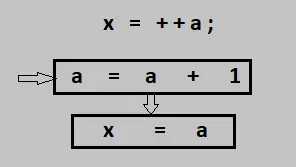-- | Next, the original value of a is decremented to 9. Increment and decrement operators are unary operators that add or subtract one, to or from their operand, sequentially. Increment operators are used to increase the value of the variable by one and decrement operators are used to decrease the value of the variable by one. If you are using prefix form then increment or decrement will be done. The decrement operator is denoted by the symbol '—'. Decrement operator takes only one operand and decrements its value by one. These operators can be written in two forms i.e. Prefix increment/decrement operator # the prefix increment/decrement operator immediately increases or decreases the current value of the variable. The operand must be a variable, a property access, or an indexer access. Then, this decremented value 9 is assigned to the variable i. These operators can be written in two forms i.e. Both are unary operators as they need only one operand. Increment and decrement operators are unary operators that add or subtract one, to or from their operand, sequentially. The increment and decrement operators in c are some of the operators, which are used to increase or decrease the value by 1. It returns a value of same type, with predefined value equal to the operand value minus one. The syntax for the decrement operators is given here: 4.1 the incerment and decrement operators. So, when we display the variable 'y' it is showing as 9. Increment operators are used to increase the value of the variable by one and decrement operators are used to decrease the value of the variable by one. The typeof operator determines the type of a given object. In programming (java, c, c++, javascript etc.), the increment operator ++ increases the value of a variable by 1. When you write overloaded operator functions, it can be useful to implement separate versions for the prefix and postfix versions of these operators. This operator adds 1 to the value with which it is written. Python is designed to be consistent and readable. If it appears before the operand, the operand is decremented, and the. What is increment and decrement operator. 4.1 the incerment and decrement operators. The increment and decrement operators in c are some of the operators, which are used to increase or decrease the value by 1. Decrement operator takes only one operand and decrements its value by one. Python is designed to be consistent and readable. Increment operator is represented by '++'. The decrement operator is supported in two forms: Note that, when an increment or decrement is used as part of an expression, there is an important difference in prefix and postfix forms. Neither operator works on doubles, booleans or strings. In this program, value of i 10 is compared with 5 in while expression. There are two such operators. It returns a value of same type, with predefined value equal to the operand value minus one. What we are going to see through this article is we will see in detail about increment and decrement operators in python. Incrementing and decrementing are such common operations that java provides special operators for them. In our previous tutorial, we learned about using mathematical operators with variables. We will learn about the increment and decrement operators. Before a variable or after a variable. The operand must be a modifiable lvalue. Explaining the sequence of operations in our last code. In this program, value of i 10 is compared with 5 in while expression. For instance, incremental operator ++ is used to increase the existing variable value by 1 (x = x + 1). For instance, incremental operator ++ is used to increase the existing variable value by 1 (x = x + 1). The void operator discards an expression's return value. In our previous tutorial, we learned about using mathematical operators with variables. 4.1 the incerment and decrement operators. Let's say we have defined a class integer for handling operations on integers. Both increment and decrement operator are used on single operand or variable, so it is called as unary operator. The operand must be a modifiable lvalue. Increment and decrement operators are unary operators that add or subtract one, to or from their operand, respectively.they are commonly implemented in imperative programming languages. Neither operator works on doubles, booleans or strings. Note that, when an increment or decrement is used as part of an expression, there is an important difference in prefix and postfix forms. If it appears before the operand, the operand is decremented, and the. Programming languages like c/c++/java have increment and decrement operators.these are very useful and common operators. In this program, value of i 10 is compared with 5 in while expression.


--: In programming (java, c, c++, javascript etc.), the increment operator ++ increases the value of a variable by 1.